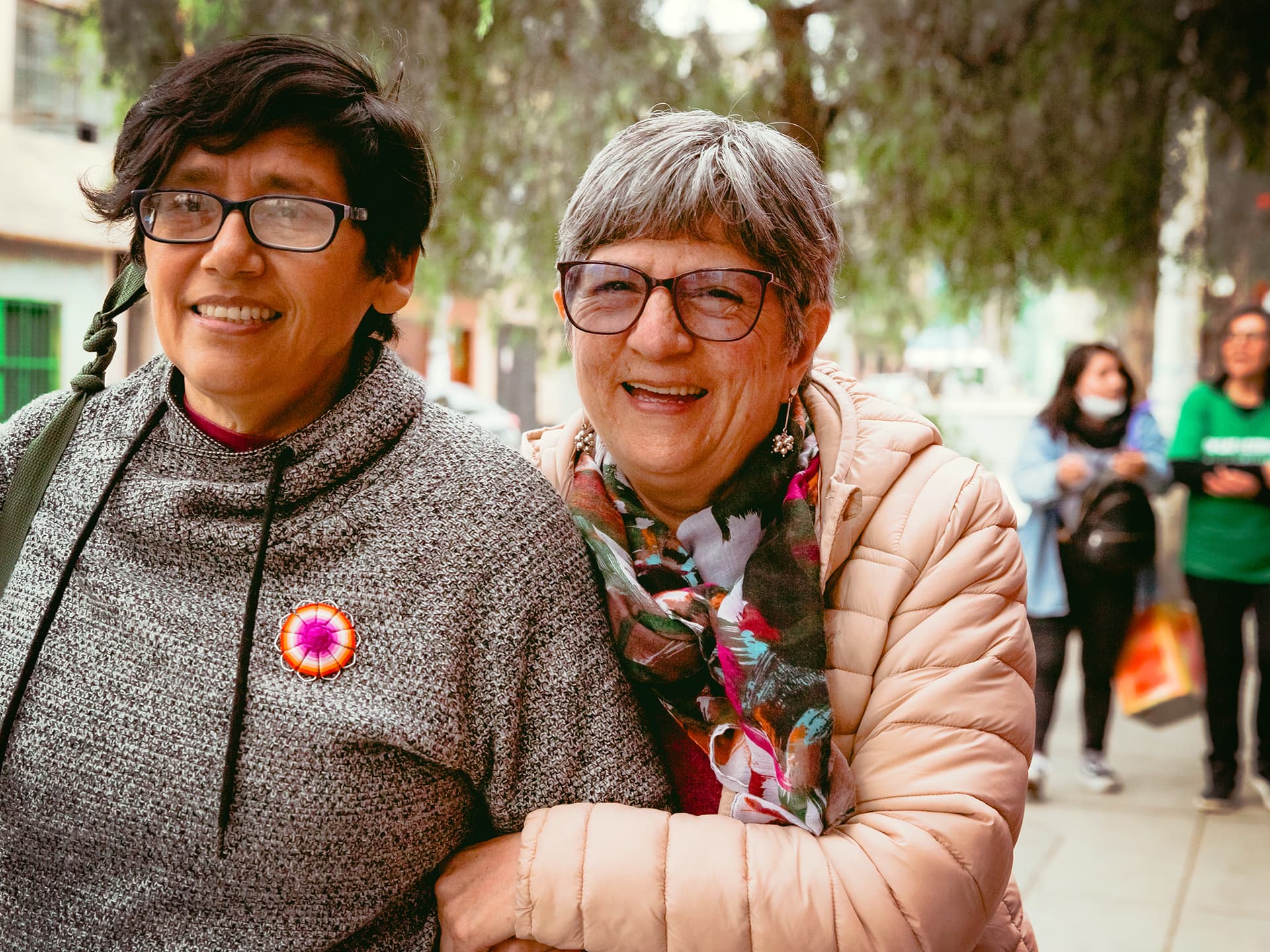
Learning Together Brings Transformation
Since 2021, Diakonia has been running a Learning Program designed to build transformative knowledge and skills to address critical challenges.
This initiative, created in collaboration with partners, focuses on shared learning, reflecting on experiences, best practices, and exploring new ideas. It draws from the deep insights of our partners and Diakonia’s extensive global expertise.
The learning spaces include participants from the four regions where Diakonia operates and is centered around five key themes:
- Re-thinking Democracy: Focusing on the political engagement of youth and women, with participants from Burkina Faso, Mali, Zimbabwe, Thailand, Cambodia, Sri Lanka, Lebanon, Palestine, and Paraguay.
- Local Knowledge and Resilience promoting alternative views of development: With participants from Kenya, Somalia, Bangladesh, Sri Lanka, Myanmar, Bolivia, and Honduras.
- Business and Human Rights: Involving participants from Somalia, Zambia, Cambodia, Colombia, Honduras, and Peru.
- Intercultural and Intersectional Approaches for Gender Justice: Exploring ideas with participants from Kenya, Egypt, Bangladesh, Thailand, Myanmar, Colombia, Bolivia, and Paraguay.
- Faith and Rights in Civil Society: Bridging rights-based and faith-based agendas with representatives from Peru, Cuba, Colombia, Egypt, and Sweden.
This program has brought staff and partners closer together, driving transformation in perspectives, relationships, collaboration, competencies, and practices among both Diakonia's staff and its partners.
Promoting Social Change through a Faith-Based and Human Rights Perspective
At Diakonia, we understand that faith and human rights are not only compatible but are powerful forces for positive change. Through one of our Learning Spaces, we deepen our understanding and that of our partners, about the role of faith in development, particularly in political, cultural, and social contexts.
The space drive transformative knowledge and strategies that support development actors, in advancing rights-based and faith-based agendas, enabling more effective engagement with diverse actors.
Our objectives are to:
- Deepen the understanding of Diakonia staff and partners regarding the role of religious beliefs in local contexts, particularly when engaging with faith-based actors.
- Increase the understanding of faith's role in peacebuilding and reconciliation in conflict settings.
- Strengthen the understanding of faith's contribution to social justice efforts.
- Improve the understanding of the secular state and religious fundamentalism in the political/public sphere.
- Explore the potential for creating a common language between believers and non-believers for rights-based work.

Promoting Social Change Among Buddhist Monks in Myanmar: The Kalyana Mitta Foundation's Efforts for Dialogue and Tolerance
The Kalyana Mitta development foundation is a Buddhist youth development organization, working in Myanmar to promote dialogue, encourage social engagement, and drive a shift in mindset among conservative Buddhist monks. They call themselves “social Buddhists” and focus on challenging the negative attitudes, particularly towards Muslims, that are often found in the Buddhist school curriculum (known as “Tamar schools”). Their work is based on the five Buddhist principles, with the first principle “do not kill”, as they advocate for a mindset change against hate speech.
"We could do more to explore the connections and synergies between faith and human rights. As these monks have to both “deconstruct and reconstruct” their existing beliefs and thought systems, we need long-term commitment, patience, and a careful, step-by-step approach, while maintaining a low profile. We have already seen many positive signs. By building a grassroots network with those who have embraced change, we can make a significant impact," says the program officer of The Kalyana Mitta Foundation.

Empowering Muslim Women and Communities in Sri Lanka: Advancing Progressive Interpretations of Islam and Education Reform
The Muslim Women's Reasearch and Action Forum (MWRAF) is a progressive organization working with women’s rights, peacebuilding, sexual and reproductive health and socio-economic justice. They work closely with Muslim religious leaders. One of their main focuses is promoting “progressive” interpretations of Islamic scriptures through education, awareness and research.
"As a women's rights organization, we focus on supporting Muslim women, marginalized communities, and children who are not attending school. In Sri Lanka, we observed a troubling trend: madrassa schools were rapidly proliferating, often generating income from individuals with limited education, resulting in inadequate teachings and the risk of indoctrinating young students. We also discovered that many of these schools lacked a formal, recognized curriculum and were not officially registered," says a Senior Programme Officer at the Muslim Women’s Research and Action Forum.
"We began collaborating with theologians and scholars to differentiate between ‘traditional male interpretation‘ of the Quran and those that are contextual. We established study circles focused on the Quran to discuss these issues. We then engaged influential people, such as community leaders, lawyers, human rights advocates, and respected theologians, and developed materials such as research papers on progressive interpretation of specific themes."
"By demystifying the teachings using accessible language, we made the texts more understandable to the community. Through community education, followed by the involvement of leaders in curriculum development, we were able to drive change. As a result, we have now trained 200 teachers who are educating children aged 8 to 14.", explains the officer from MWRAF.


Building Bridges for Social transformation: The Council of Churches in Zambia's Role in Promoting Human Rights, Gender Justice, and Faith-Based Dialogue
The Council of Churches in Zambia has a vision to be a prophetic voice, working in cooperation with others to strengthen capacities. They advocate for good governance, human dignity, gender justice, support youth and owns two teachers’ colleges. In a conservative country where 90% of the population is Christians, the Council’s role is crucial when it comes to driving social change.
“Churches are part of the problem and should also be part of the solution, since we are recognized and respected within the community. Ignoring church leaders, can complicate development efforts. Churches holds resources of people, power, infrastructure, and influence even in the absence of a functioning government. There are many commonalities between human rights and faith. For instance, principles like human dignity, justice, resource management, accountability for those in power, and the fight against marginalization and greed are fundamental in both faith and human rights.
An uninformed religious leader can be a danger to themselves and others. To achieve development goals, it is essential to work with religious leaders. Increasing knowledge among people helps reduce stigma.
Spouse abuse and child marriage are urgent issues in our country. Addressing these problems can have a ripple effect on other areas as well. Human dignity, as a right granted from Genesis, is foundational. In the language of development, we call it human rights. Dignity is a given from God, and we can motivate efforts to combat gender-based violence and child marriage by linking the Biblical values with these practices. says Reverend Emmanuel Chikoya from The Council of Churches in Zambia.
"When we promote dialogue between different faith actors and provide information, it is far more effective than pushing a specific agenda, which could be counterproductive and fuel extreme ideas. Using examples of how people living with a different understandings of human sexuality impact families can help religious leaders engage in dialogue and better understand the challenges. This is also where we can emphasize the values of respect and dignity for all people. The Bible does not condone violence against these individuals," adds Reverend Emmanuel Chikoya."

Finding entry points between faith and feminist actors - A story from Peru country office
What does it mean to you that Diakonia is both a rights-based and faith-based organization?
It gives us the opportunity to approach diverse actors from both a faith and human rights perspective to defend rights. Initially, our faith identity was a challenge for us, but now we can see our added value and role. We did not use to include religious actors in our context analysis, but we noticed that they were making their way into politics and we understood the urgency and started identifying allies with whom we could work.
What entry points did you identify?
We decided to invite faith leaders to our regional Gender forum and identified issues important to address, like diversity, sexual and reproductive health. We asked how we could approach these topics from a new faith narrative and how we could use feminist theology. We decided together that between theologians and the gender group we should write four papers on the topic.
What did you learn?
This space is an important area for dialogue, both for us as an organization and for broader engagement. We need to share our experiences and convince others to join us, as a human rights organization grounded on feminist principles and faith-based values. We are in a crisis situation, and these spaces can open doors.
Denisse Chavez, Diakonia Peru Country Office
